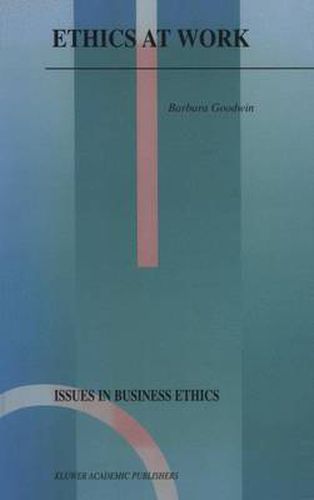Readings Newsletter
Become a Readings Member to make your shopping experience even easier.
Sign in or sign up for free!
You’re not far away from qualifying for FREE standard shipping within Australia
You’ve qualified for FREE standard shipping within Australia
The cart is loading…






What would tempt you to whistleblow? Do Codes of Conduct make organisations ethical? How do people react to taking the blame for others? This book answers such questions, drawing on the views of employees in eight large organisations. One finding is the “whited sepulchre phenomenon’: an organisation which presents a squeaky-clean image to the world but has intrinsic failings which cause moral dilemmas for staff. While treatment of customers is regulated by Codes and Charters, internal organisation is typically more anarchic. The study also exposes the moral conflicts generated by party-political machinations in organisations with democratic governance.
The book offers a unique perspective on ethical attitudes at work and reactions to responsibility and accountability. It finds that, although religious belief is declining, strong moral beliefs still thrive and "ethical employees’ abound. It highlights the importance of empowerment, procedures, and professionalism in creating the "moral organisation’. This original study will interest practitioners in business, the public sector and NGOs, especially human resources professionals, as well as philosophers and business ethicists.
$9.00 standard shipping within Australia
FREE standard shipping within Australia for orders over $100.00
Express & International shipping calculated at checkout
What would tempt you to whistleblow? Do Codes of Conduct make organisations ethical? How do people react to taking the blame for others? This book answers such questions, drawing on the views of employees in eight large organisations. One finding is the “whited sepulchre phenomenon’: an organisation which presents a squeaky-clean image to the world but has intrinsic failings which cause moral dilemmas for staff. While treatment of customers is regulated by Codes and Charters, internal organisation is typically more anarchic. The study also exposes the moral conflicts generated by party-political machinations in organisations with democratic governance.
The book offers a unique perspective on ethical attitudes at work and reactions to responsibility and accountability. It finds that, although religious belief is declining, strong moral beliefs still thrive and "ethical employees’ abound. It highlights the importance of empowerment, procedures, and professionalism in creating the "moral organisation’. This original study will interest practitioners in business, the public sector and NGOs, especially human resources professionals, as well as philosophers and business ethicists.